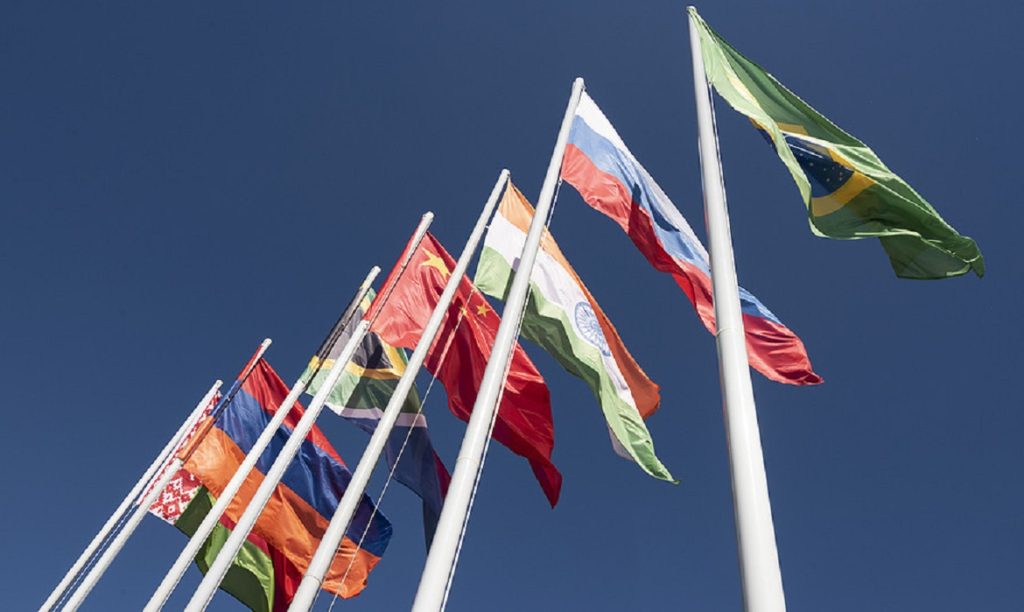By Fazeer Ahmed
In recent years, there has been considerable speculation surrounding Pakistan’s expressed interest in joining the BRICS bloc. The acronym “BRICS” represents an influential grouping of five major emerging economies: Brazil, Russia, India, China, and South Africa.

As a nation with a strategic geographic location and considerable potential, Pakistan’s eagerness to become a part of this alliance deserves a thorough analysis of the opportunities and challenges it presents.
On the surface, Pakistan’s desire to join BRICS seems well-founded. The alliance accounts for nearly 42% of the world’s population and approximately 23% of global GDP. By becoming a member, Pakistan could tap into the economic opportunities provided by this formidable bloc. Enhanced trade ties with BRICS nations could bolster Pakistan’s economy, stimulate foreign investments, and foster economic growth.
Moreover, BRICS offers a platform for member countries to engage in extensive dialogue on geopolitical issues, security matters, and regional stability. Pakistan, located in a region often plagued by tensions and conflicts, could leverage BRICS to present its perspectives and seek constructive solutions to regional challenges, including border disputes and counterterrorism efforts.
Furthermore, Pakistan’s inclusion in BRICS could act as a diplomatic breakthrough for a country that has sometimes faced isolation on the international stage. Membership in BRICS would signify a vote of confidence in Pakistan’s potential and its role in shaping regional dynamics, bolstering its standing in the global arena.
However, Pakistan’s aspiration to join BRICS comes with its share of complexities and challenges. Foremost among them is the need for Pakistan to meet the stringent economic and geopolitical criteria set by the existing BRICS members. Economic reforms, good governance, and fiscal responsibility will be pivotal in establishing Pakistan’s credibility as a reliable partner within the bloc. Without substantial economic growth and structural reforms, Pakistan may struggle to find firm footing in a group dominated by economic powerhouses.
Moreover, BRICS members have diverse strategic interests and often exhibit contrasting approaches to global affairs. For instance, China’s ambitious Belt and Road Initiative (BRI) and India’s concerns over its territorial disputes with Pakistan pose intricate challenges to finding common ground within the alliance. Pakistan will need to navigate these complexities adeptly and strike a balance to contribute positively to the alliance’s cohesion and progress.
Furthermore, joining BRICS might exacerbate regional tensions. Pakistan’s regional rival, India, is already a member of the bloc, and historical animosities between the two countries could spill over into BRICS discussions. The potential for disagreements over sensitive issues may hinder constructive dialogue and cooperation within the alliance.
Another crucial aspect for Pakistan to consider is the scrutiny it might face regarding its record on human rights and counterterrorism efforts. Questions could arise about Pakistan’s commitment to combating extremism and ensuring the protection of human rights, both domestically and in its foreign policy. BRICS members, particularly India, have raised concerns over terrorism emanating from Pakistan, which may require addressing before gaining full acceptance within the alliance.
One of the key challenges that Pakistan must overcome is the perception of being overly reliant on external assistance. While BRICS membership might offer economic benefits, it should not lead to complacency or reduce efforts to strengthen Pakistan’s domestic industries and create a sustainable and self-reliant economy. The country should focus on fostering indigenous innovation and developing robust trade relationships with a diverse range of countries to avoid undue dependence on any single partner.
In conclusion, Pakistan’s willingness to join BRICS presents a mix of opportunities and challenges. Membership in this influential bloc could open doors to economic growth, increased diplomatic leverage, and strategic partnerships. However, Pakistan must diligently address economic reforms, geopolitical complexities, and regional rivalries to become an integral and constructive part of the alliance.
In pursuing BRICS membership, Pakistan should approach the endeavor with a clear-eyed understanding of the commitments and responsibilities that come with being part of such a significant and diverse coalition. Only through determined efforts to enhance its economic, diplomatic, and security credentials can Pakistan hope to fully reap the potential benefits that BRICS membership offers while contributing positively to the shared objectives of the bloc.
Auther: Fazeer Ahmed is a Quetta-based undergraduate, final semester student of International Relations at the University of Baluchistan. He aspires to advance in research and policy-making. His areas of interest are Foreign Policy Analysis, Diplomacy, Strategic Studies, International politics, National Security Policy, and Cyber Warfare.
(The views expressed in this article belong only to the author and do not necessarily reflect the views of World Geostrategic Insights)







